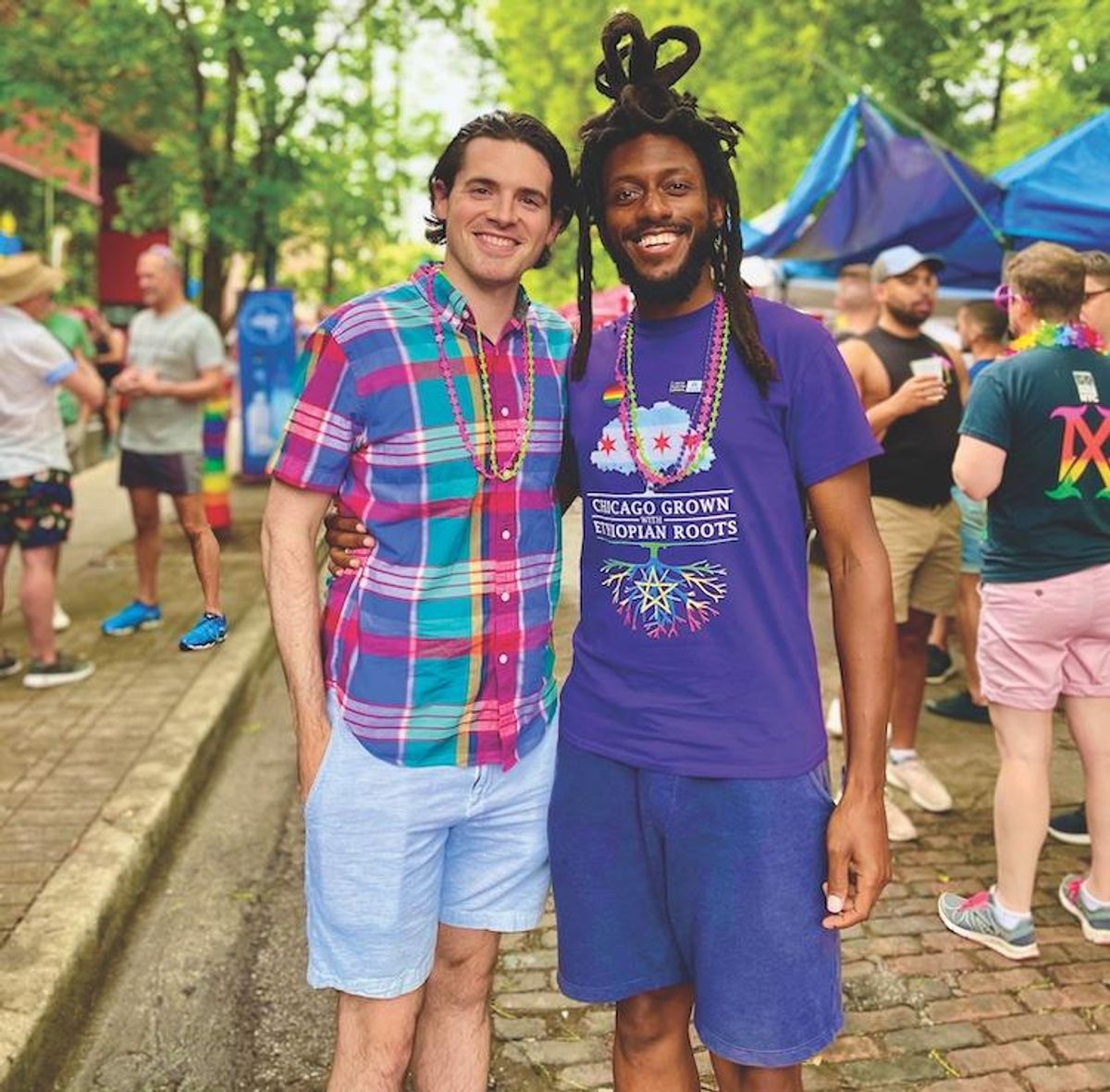Keeping a relationship healthy when both partners have demanding careers is challenging enough, but when one of those careers is being a public official, the challenge becomes even greater.
Mike Simmons, an Illinois state senator, and his partner, Michael Sullivan, who works for health insurance company Blue Shield, have been dealing with that challenge since early in 2021, when Simmons was appointed to replace retiring Sen. Heather Steans.
"Becoming a state senator is an enormous adjustment," says Simmons, who's the first out gay state senator in Illinois and the first Black senator from his district, the Seventh, which covers the far north side of Chicago and is where he has spent his entire life. "It's a big district that's really diverse," with about half the population being people of color, he notes. He says being a state senator is more than a full-time job: "It takes a lot of time to do it right."
But he and Sullivan are committed to doing their relationship right as well. "It's a daily challenge to maintain some balance," says Simmons, who is also gender-nonconforming. The two seek to make time for their favorite activities, even just watching TV together or walking around the neighborhoods of the district. "I'm really committed to Michael and to having the space for our relationship to continue to thrive," Simmons says. Sullivan adds, "I've also tried to be intentional about spending time together."
Before becoming a senator, Simmons, now 38, worked for various politicians, including U.S. Sen. Dick Durbin of Illinois. In addition, he ran a public policy consulting firm and was deputy director of My Brother's Keeper Alliance, an initiative of the Obama Foundation.
Sullivan, 34 and of Irish and Italian heritage, grew up mostly on the East Coast but came to the Midwest to attend Notre Dame University in Indiana. After graduating, he worked for a time in athletics at Notre Dame, but health challenges drew him to working in health care and his job with Blue Shield.
The two have been together for three years and several months. They met at a champagne brunch fundraiser in Chicago for the LGBTQ Victory Fund, which works to elect out candidates to office. They talked for only about 60 seconds, during which Simmons asked Sullivan for his email address, ostensibly so they could discuss the health care industry. "I saw through that a little bit," Sullivan recalls. They met again two weeks later, and, they say, the rest is history.
While Simmons's position as a senator creates challenges, it's also added a new layer to the couple's relationship. "Mike sits on several health care-related committees, and because of my work in that area, I've been able to help with advice, be a sounding board," Sullivan says.
"I've really appreciated seeing a different lens to Mike since he's been in this role," he continues. "It's been a great opportunity for me to learn about [him] and navigate a lot of new experiences because of this." They've had many conversations about health care disparities and other problems they're passionate about solving.
Simmons reports a similar experience. "Every couple [of] months or so, I learn more about Michael that makes me fall more in love with him," the senator says. "I can't imagine my life without him."
The couple's life will continue to be hectic this year, probably even more than it has been: Simmons is running for election to a full term as senator. His goals for his political career include continuing to build the racial justice movement.
"We are living through the most extended movement around racial justice our country has ever seen.... Right now, people are hungry for a new generation of leaders to step up," he says. "I felt like it was time for someone like me to serve as this level of government."
In working for racial justice, Simmons is carrying on a family tradition. He credits his mother, who died in 2020, with helping him learn about diversity and standing up to racism. She ran a hair salon in Rogers Park, which is part of his district, and served a diverse clientele. In the early 1980s, when she was in her teens, hers was one of the first Black families to integrate the Lincoln Square neighborhood, also in the district, and stayed despite not getting a friendly reception. "I like to say my family's still there, the racists are all gone," Simmons says.
This story is part of The Advocate's 2022 Love issue, which is out on newsstands February 2022. To get your own copy directly, support queer media and subscribe -- or download yours for Amazon, Kindle, Nook, or Apple News.


















































































Fans thirsting over Chris Colfer's sexy new muscles for Coachella